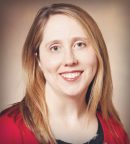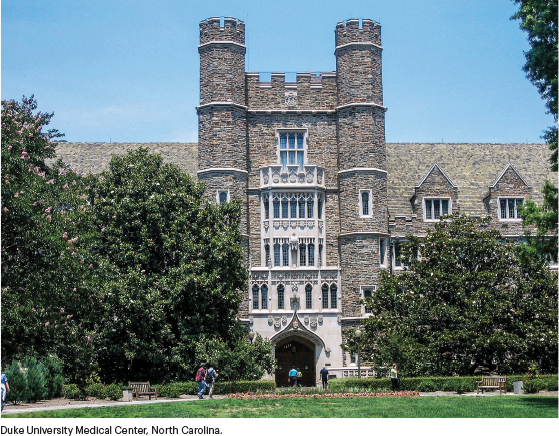
Laura Goff, MD
Laura Goff, MD, Medical Director of the Hematology and Oncology Division at Vanderbilt-Ingram Cancer Center, Nashville, was born in Chicago but reared in Lewisville, a suburb of Dallas. “I come from a long line of nurses, which early on influenced my decision to pursue a career in medicine. Moreover, my father has a PhD in chemistry and worked as a food scientist at Frito Lay in Dallas, which is the reason we left Chicago for Texas,” said Dr. Goff.
Fell in Love With Duke
During her high school years, Dr. Goff excelled in math and science, and, as she thought about college, a serendipitous trip east led to her choice. “My parents are born and bred Kansans, and my decision for undergrad work came down to Duke University or the University of Kansas (UK). My dad lobbied for UK by taking me there to meet his PhD mentor, as well as a basketball game. It was a terrific experience, but I had visited some relatives at Duke; as soon as I set foot on the campus, I fell in love with it. So, in 1993, I was accepted to Duke, where I pursued a BS degree in chemistry,” she explained.
“Dr. Jordan Berlin’s infectious enthusiasm was in no small part what brought me to Vanderbilt for my fellowship and has kept me here to this day.”— Laura Goff, MD
Tweet this quote
Dr. Goff continued: “When I entered Duke, a medical career was on my tentative list, but I had a different view from a lot of my classmates, many of whom came from physician families. My Dad always stressed that I didn’t have to be a doctor to be successful because there were a lot of fulfilling avenues within the sciences. During my undergrad work, although medicine became a stronger attraction, I didn’t make the full mental and emotional commitment to becoming a doctor. In fact, it wasn’t uncommon for students to enter a premed course and change their minds along the way.”
Dr. Goff explained that she suffered from a bit of big-campus jitters when she first entered Duke, where, unlike high school, she wasn’t at the top of every class. “I had a terrific mentor in Dr. Pinnick, who was my organic chemistry professor. He helped me settle in and was incredibly supportive. Duke is a liberal arts school, and, in addition to my chemistry major, I did a minor in women’s studies. At that time, the sciences and liberal arts departments were on opposite sides of the campus, and I would take the shuttle back and forth, which really broadened my appreciation of how different people viewed the world,” shared Dr. Goff.
A Trip to the Big Apple
After graduating from Duke University in 1997, Dr. Goff entered The University of Texas (UT) Health Science Center at San Antonio. “It was my experience at UT that really helped me decide on oncology as my specialty. During my first year of taking basic science courses, the professors’ description of the intriguing pathology of carcinogenesis and the potential we were gaining to develop treatments left me convinced that there was no other field quite as exciting as oncology. Moreover, UT was known as a hotbed in the cancer drug-development universe, which added yet another layer of excitement to oncology,” said Dr. Goff.
During medical school, Dr. Goff and several friends decided to spend a month away from Texas and venture east to the Big Apple. “I applied for and was accepted to a medical rotation at Memorial Sloan Kettering Cancer Center. I must admit, even though I was thrilled for the opportunity, it was a bit intimidating to leave San Antonio and show up in New York City to work at Memorial Sloan Kettering. However, the attending I was assigned to was Dr. Sunil Sharma, and on the wall of his office was his letter of certification from his fellowship from San Antonio, so I immediately was put at ease,” she commented.
Dr. Goff was assigned to the hepatobiliary service, where she rotated for a month. “While I was there, the IFL study was published, and everyone was excited about the new possibilities in treating colon cancer. Seeing firsthand those people who had been on the study just accelerated the sense that we were moving toward major advances in cancer,” said Dr. Goff.
When asked about her choice of residency programs, Dr. Goff replied: “At that point, I was a pretty timid person and felt I needed a program that would challenge me in all aspects, so I ended up at UT Southwestern in Dallas. It had a reputation as a hands-on program that gave residents a lot of autonomy, which would push me to grow, and it did. It had a reputation as sort of a menacing program, but nothing could be farther from the truth. The residents and faculty worked together seamlessly,” she related.
Her first attending during residency was Dr. Henrik Westergaard, who was renowned for teaching and mentoring residents and fellows at UT Southwestern. “Dr. Westergaard was a gastroenterologist, a classic teacher who was very supportive of me. I loved learning and thinking about gastrointestinal diseases, but I had no interest in scoping, so I knew that gastrointestinal oncology, with all of the complexity of the organs in that system, was a perfect fit for me,” said Dr. Goff.
A Mentor’s Infectious Enthusiasm
As Dr. Goff began to think about fellowship opportunities, several of her friends who had done residencies at Vanderbilt University Medical Center spoke effusively about their experiences, so Vanderbilt moved to the top of her fellowship wish-list. “At that time, Vanderbilt had an individualized interview day for aspiring fellows; on my day, I met my mentor, Dr. Jordan Berlin. His enthusiasm for all of the things he felt I could accomplish during my fellowship was immediately apparent. I remember it as if it were yesterday, meeting him in his office and talking about all of the engaging projects I could do during my fellowship. His infectious enthusiasm was in no small part what brought me to Vanderbilt for my fellowship and has kept me here to this day. Dr. Berlin has encouraged and mentored me along the way,” said Dr. Goff.

Dr. Goff’s fellowship centered on drug development for gastrointestinal cancers, which carried into her position at Vanderbilt. “As my fellowship was winding to a close, sorafenib, the first drug for liver cancer, was approved by the U.S. Food and Drug Administration. It was pretty exciting.”
Dr. Goff continued: “Right at the end of my fellowship and at the beginning of my faculty career, I did an MS in clinical investigation to round out and strengthen my foundation for clinical research. At that time, I thought we would find the main target for hepatocellular carcinoma, which we could pair with effective drugs. We’re making progress but are still searching for that target-drug combination. The other primary tumor I treat is cholangiocarcinoma, which we’ve made better progress in finding targetable alterations and pairing them with effective agents. Since starting at Vanderbilt, I’ve been fortunate to be involved in drug-development efforts in both of these cancers.”
Leadership Role With Focus on Mentorship
In addition to her research work, Dr. Goff has moved into a leadership role in administration, with a strong focus on mentorship. “In 2009, when I joined the faculty, I became Associate Director of the fellowship program. With mentorship and collaboration from Dr. Jill Gilbert, we realized there are some simple things that can be borrowed from the basic PhD science mentorship world committee that are relevant to clinical researchers to ensure that mentees and fellows stay on track. During that time, I also realized the significant impact one could have in administration on clinical care and research, and I did that for about 10 years,” she continued. “I transitioned through various stages of administration, most recently assuming the role of Executive Medical Director of Vanderbilt’s Cancer Patient Care Center.”
Vanderbilt’s Response to COVID-19 Pandemic
Asked about how her institution has coped with the COVID-19 pandemic, Dr. Goff replied: “I truly believe that Vanderbilt has been a front-runner around the nation in our response, from a scientific and research standpoint and as a leader in the COVID-19 and Cancer Consortium, which is examining the impact the coronavirus is having on the delivery of cancer care. Vanderbilt also has offered a relentless focus on education and media reach-out to create guidelines to help institutions navigate this difficult challenge and still deliver high-quality care to our patients with cancer.”
Optimism and Sleep
Dr. Goff is filled with optimism about the future of oncology. She mentioned the advances made in gastrointestinal cancers and the intriguing work being done to pair emerging immunotherapies with the new generation of targeted drugs.
As for her own personalized therapy to decompress, Dr. Goff said: “For one, I am a big believer in the power of sleep, to rejuvenate and destress. Also, I believe in taking time to disconnect from the digital world. Then, there’s cooking, which I love to do, and spending time with my family. So, that combination of things helps me avoid the kind of stress that can lead to burnout.”
DISCLOSURE: Dr. Goff reported no conflicts of interest.

